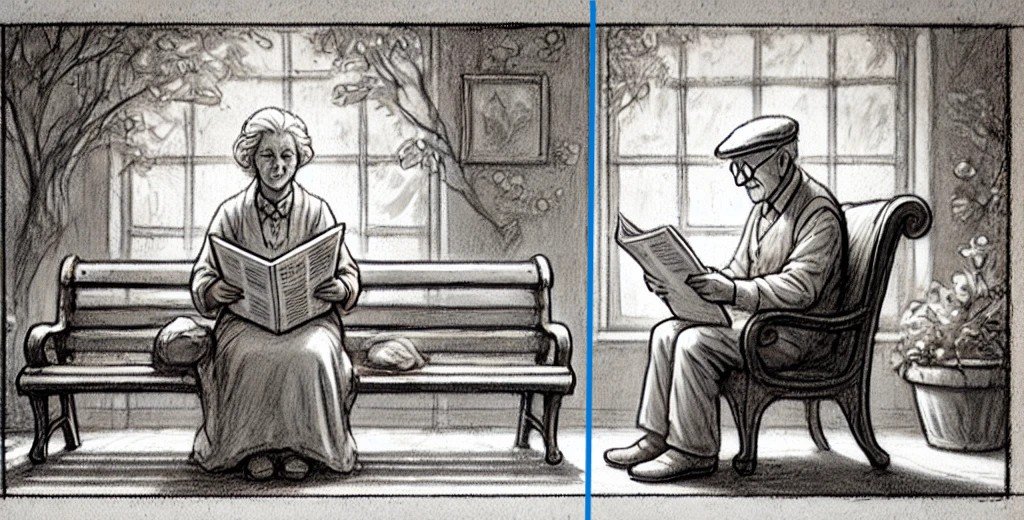Legs aching, but I can’t stop. Everyone is ahead of me, chanting “Swamiye Saranamayyappa”. I can’t turn back now. I’ve come too far. I have to keep going.
Ravi was just eight years old, taking his twentieth step onto the twenty-first on the steep Sabarimala path. His father had brought him here to learn patience, to understand discipline, to reach the top and discover what it meant to surrender.
The path grew steeper with each step. Looking up, Ravi could see the trail tilt sharply into the mist. He clung to the railing, careful not to slip. His knees wobbled with fatigue. Then, a sharp sound, his leg hit a stone, and blood began to trickle down his shin. His father and others were ahead, laughing and sipping water from steel tumblers, unaware.
Ravi stood frozen, the pain too deep for him to cry out. He simply wept silently.

A red shawl appeared in front of him. A girl, about his age, offered him a piece of her torn dupatta.
“Tie it tight,” she said gently.
He looked up at her. Amina. A familiar face. She was his neighbor at the village.
Later, when his father came rushing back, he saw the cloth tied around Ravi’s knee and nodded gratefully at Amina and her father. That moment stayed with Ravi forever, her kindness, her calm, her red shawl fluttering in the wind.
Over the years, Ravi and Amina became more than just neighbors. In a time when love bloomed quietly through handwritten letters and shared silences, they found each other beneath the mango tree in their colony. They’d exchange looks during evening prayers, pass notes hidden in textbooks, whisper dreams under the same mango tree. Their secret holder, the mango tree.
But silence has a limit. Eventually, whispers grew into warnings. The world around them got louder. “What will people say?” began to echo louder from the people who they hold dear of than each other. They were separated, not by choice, but by fear.
Amina was married into a devout Muslim family in the same village. Ravi married a Hindu woman chosen by his family.
Life moved on.
They saw each other sometimes at the town bakery or near the post office. A breeze might lift Amina’s dupatta as she walked by. Ravi’s laugh might carry a little too far when he spotted her from across the road. But that was it, glimpses, shadows, and a quiet ache.

Decades later, in their seventies, they both read the same headline over their morning chai.
“Waqf Law Introduced. All verbal donations under review.”
Amina’s family had given a property to a madrasa under a verbal agreement. Ravi’s grandfather had offered a strip of land near the same building, never written down, just a gesture of goodwill from a different time.
They met again, this time at the registrar’s office.
Amina saw him first and smiled, “Oh, you’re still around?”
Ravi looked up from a stack of old papers and returned her smile. “When did I ever leave?”
Even if those questions came from their mouths, it was asked by their hearts.
They sat on the bench outside, thin sunlight warming the stone. Between faded documents and files, there was space for conversation.
“You know,” Amina began, “my grandfather gave that land behind the mosque because your grandfather promised the water would be shared for the madrasa students.”
“I remember,” Ravi said. “It wasn’t about religion then. It was about the kids having drinking water, having some form of relief. It was also about trust.”
She looked at the forms in her lap. “And now they want proof, papers, stamps. They want to measure belief in inches and ink.”
He nodded. “Maybe because too many people started calling kindness a weakness.”
They were quiet for a while.
“It feels like they’re undoing everything our families tried to build,” she said softly.
“Maybe,” Ravi replied, “or maybe they’re giving us one last chance to stand for it.”
Amina smiled faintly. “You still are an optimist and talk like a poet.”
He shrugged. “You still give me reason to.”
They laughed quietly and exchanged documents, old letters, and even older memories. One photo had a young Ravi caught glancing sideways at Amina, and they both chuckled, remembering the day it was taken.
For days, they sat side by side, piecing together the past with yellowed papers and fragile hope. It wasn’t romance anymore, it was something deeper. A sense of understanding, familiarity and a care without condition.
Once the registration was complete, they stood outside the office for a while.
“I guess this is it,” Amina said softly.
Ravi nodded. “For this life, maybe.”
They didn’t hug. They didn’t hold hands. She placed her hand lightly on his shoulder for just a second, and he leaned ever so slightly into it. That was enough.

They walked away, two old souls taking different paths once again. But their shadows lingered, gently overlapping on the pavement behind them.
If not in this world, then maybe the next.
They kept walking.
The events that led to me writing this short story :
https://ajayan.substack.com/p/waqf-law-is-in-effect-waqf-amendment